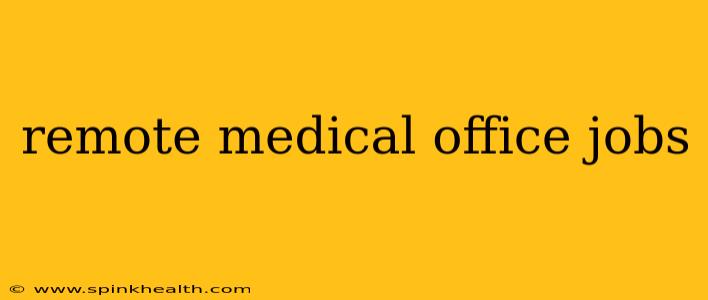The hum of the office, the constant ringing phone, the rush of patients – these are images often associated with a medical office career. But the reality is changing. A new wave of remote medical office jobs is empowering healthcare professionals to work from anywhere with a reliable internet connection, offering flexibility and work-life balance without sacrificing career progression. This isn't just a trend; it's a revolution reshaping the healthcare landscape. Let's dive into the exciting possibilities.
What Types of Remote Medical Office Jobs Are Available?
The beauty of remote medical office work is its variety. It’s not a one-size-fits-all scenario. Imagine starting your workday with a steaming cup of coffee, knowing you're about to contribute to improving people's health from the comfort of your home. This isn't a fantasy; it's the reality for many professionals. The opportunities are diverse and constantly expanding.
Some roles include:
-
Medical Biller/Coder: These professionals are the backbone of medical billing. From the quiet comfort of their home office, they meticulously process insurance claims, ensuring accurate reimbursements. It's detail-oriented work, requiring strong organizational skills and a deep understanding of medical coding systems.
-
Medical Scribe: Transcribing physician notes, generating reports, and updating patient records are all part of the medical scribe's crucial role. Remotely, they can work in real-time with physicians, assisting them during patient consultations and ensuring thorough documentation.
-
Medical Receptionist/Scheduler: While some receptionist tasks require on-site presence, many scheduling and administrative duties can be performed remotely. Managing appointments, answering phones, and handling patient inquiries are all possible from a home office.
-
Medical Assistant: Certain aspects of medical assisting, such as telehealth support, patient education via phone or video call, and record-keeping, can be done remotely. This varies based on the specific employer and state regulations.
What Skills Are Needed for Remote Medical Office Jobs?
While the specific requirements vary by job, several core skills are highly valued in the remote medical office setting:
-
Proficiency in Medical Terminology: This is non-negotiable. You need a solid understanding of medical terms, abbreviations, and procedures to effectively perform most roles.
-
Strong Computer Skills: You'll be working with various software programs, including Electronic Health Records (EHR) systems, billing software, and communication platforms.
-
Excellent Communication Skills: Whether it's interacting with patients, physicians, or insurance companies, clear and professional communication is crucial.
-
Organization and Time Management: Working from home requires exceptional self-discipline and the ability to manage your time effectively without direct supervision.
-
Technical Proficiency: Troubleshooting technical issues, ensuring a reliable internet connection, and utilizing virtual meeting platforms are essential.
How Can I Find Remote Medical Office Jobs?
Finding these opportunities requires a proactive approach. Several avenues exist to discover your ideal remote position:
-
Online Job Boards: Websites like Indeed, LinkedIn, and Monster often list remote healthcare positions. Be sure to use specific keywords such as "remote medical biller," "virtual medical receptionist," or "work from home medical scribe."
-
Company Websites: Many healthcare organizations are actively seeking remote staff. Check the career pages of hospitals, clinics, and medical billing companies.
-
Networking: Connect with professionals in the healthcare field through online groups and professional associations. Networking can provide invaluable insights and potential job leads.
Are Remote Medical Office Jobs Secure?
The security of a remote medical office job depends on various factors, including the employer's stability and the nature of the role. Reputable companies prioritize employee security and offer robust training and support. However, as with any job, it's essential to research the employer thoroughly before accepting a position.
What Are the Advantages and Disadvantages of Working in a Remote Medical Office?
Advantages:
- Flexibility: Set your own schedule and work from anywhere with a reliable internet connection.
- Work-Life Balance: Reduce commuting time and integrate work more seamlessly into your life.
- Comfort and Convenience: Work in a comfortable and familiar environment.
Disadvantages:
- Isolation: Some individuals may find working from home isolating, missing the social interaction of a traditional office setting.
- Technology Dependence: A reliable internet connection and computer are essential.
- Self-Discipline: Successful remote work requires strong self-discipline and time management skills.
The world of remote medical office jobs is dynamic and ever-evolving, offering a fantastic opportunity for those seeking flexibility and a fulfilling career in healthcare. With the right skills and a proactive approach, you can embark on a journey toward a rewarding and empowering remote career in the medical field.

